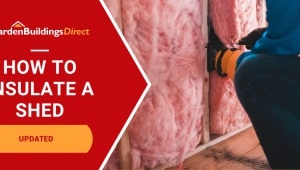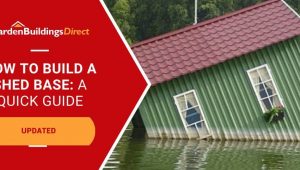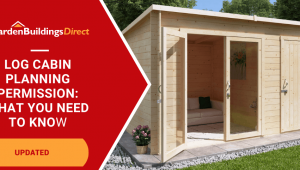Jump to:
Climate change isn’t just on its way – it’s already happening. As the garden building experts, our passion for our gardens means we’re naturally passionate about the environment and sustainability. But we’re not here to spread doom and gloom.
It’s seriously important for everyone to chip in to help prevent climate change from getting even more serious. One way to do this that we know a lot about is keeping a sustainable garden.
You might not know this, but our gardens hold a tremendous amount of power! With just a few additions and tweaks to how you manage your garden, you can make it environmentally friendly and start helping the climate.
To help you on your way, we’ve prepared a quick list of 10 things that you can do to make your garden sustainable. Now, time is of the essence – so scroll down and turn your garden into a powerhouse of sustainability!
1. Start Composting
Compost is an essential component when growing and planting in your garden, as it’s rich with all the nutrients and minerals that plants love and need to grow. Of course, we want you to grow as much as possible – but you should know that buying compost from a store can really harm the environment.
This is partly because the compost creates lots of emissions in order to get to the shop in the first place. Transporting it in lorries, boats or trains creates lots of CO2.
But its impact on the environment also comes from what store-bought compost is made from: peat. Peat is a non-sustainable resource that is important to conserve. If you have to buy compost from a store, buy peat-free compost.
If possible, create your own compost instead! All you need is an outdoor container, your food waste, and time for some helpful earthworms to get to work!
2. Conserve Rainwater

Our summers in the UK are already becoming increasingly dry, and there’s more of this in store as global temperatures rise. Watering plants, especially from hoses, can be a huge drain on water supplies – but when plants need watering, it’s unavoidable.
So, instead of using water from the tap, why not start watering your plants and tending to your garden using recycled water. One of the best and easiest ways to do this is to conserve rainwater.
Conserving rainwater can be as simple as putting a wide tub in your garden to collect the water when it rains. This method won’t get you a ton of water, but it will collect some. For a really effective system, connect your rainwater collection tub up to your house or shed’s guttering system.
This is a surefire way to store loads of recycled water!
3. Use Recycled or Biodegradable plant pots.

Plastic waste is an ever-increasing problem in the modern world. Unfortunately, plastic plant pots contribute to the issue as well. In fact, over half a billion plastic plant pots end up in landfills in the UK every single year. What’s worse is that it takes over 400 years for one of these to degrade!
To do your part in stopping this build-up of plastic waste, consider re-using any plastic plant pots that you have lying around. Doing this is an easy way to make sure they’re not ending up in landfills so quickly.
Alternatively, stop using plastic plant pots altogether. There are a number of things you can replace your plastic pots with, such as classic ceramic pots, or naturally biodegradable plant pots. Made from materials such as plant fibre, these pots are a cheap and effective way to introduce sustainability to your gardening.
4. Plant a Tree – Or Two!

The build-up of greenhouses gases, such as carbon dioxide, in our atmosphere is slowly causing the world to heat up. You know that, of course, and you know that one way to stop this buildup is to reduce the amount of emissions we release.
But another way to stop it from happening is to start collecting carbon dioxide. How? Well, it’s simple – with trees!
Trees can be our secret weapon in the battle against climate change. By collecting carbon dioxide and turning it into oxygen, they can chomp down on the carbon dioxide we put out. So go ahead and plant a tree, or two or three. Over their lifetime, they’ll eat up their fair share of CO2 and you’ll have contributed to the push for sustainability.
5. Reduce Plastic Use Throughout Your Garden
As we mentioned previously, plastic waste is a serious pollution issue. If you’ve changed out your plant pots for sustainable alternatives, why not consider doing the same for all plastics in your garden?
This could come in many forms. You could:
- Use tied string instead of plastic ties for plants that need to be tied to canes or the wall for support.
- Buy garden tools that don’t include any plastics. Opt for a wooden brush instead of one that uses plastic, for example.
- Avoid using plastic plant labels. Wooden plant labels work just as well and look even better!
Try and be inventive with reducing your plastic use – reducing the plastics you use even by a small amount can be effective in the long run!
6. Use Electric Garden Tools Over Petrol-Powered Tools

It’s time to chuck out that petrol lawnmower or strimmer, and replace it with an electric one instead!
Petrol is something that many of us can’t avoid using when it comes to cars, but garden tools are a different matter. You’ll find that electric tools are more effective than their fossil-fuel guzzling counterparts!
Electric lawnmowers and other garden equipment can often be brought in sets now, with a battery that can be used interchangeably between different tools. Buying new tools can be expensive, but when it comes to replacing the mower opt for electric!
7. Grow Your Own Vegetables

Unless you’re buying from an environmentally-oriented or waste-free shop, chances are that the vegetables you buy are doing harm to the environment. This is down to the carbon emissions spent transporting the produce, and the food waste produced by only selling vegetables that are kind on the eye.
Now, for many of us, we simply don’t have the time, energy, or money to buy a greenhouse or start our own vegetable garden. But, if you think you could, then you definitely should!
You won’t be able to have all kinds of vegetables at all times of the year, but you’ll feel great the first time you bite into a home-grown carrot or a freshly-picked tomato. Growing at home reduces emissions and it’ll save you money in the long run.
8. Choose Natural Weed Control Over Herbicides
Herbicides and pesticides cause a ton of damage to local ecosystems and wildlife every single day. They may be the easiest way to get rid of pesty weeds, but they’re doing more harm than good.
Instead of buying a product from a shop, try some of these homemade, safe methods for getting rid of weeds instead. You’ll be protecting the local ecosystem and ensuring that your garden is full of wildlife!
9. Grow Native, Pollinator-Friendly Plants

One of the biggest creators of Garden waste, year on year, is the culture of buying non-native flowers and bulbs only to throw them away after summer ends. You can’t avoid getting rid of them, as they won’t survive winter, but doing this is both unsustainable and expensive.
Instead of falling into this cycle, why not choose to fill your garden with native plants? Native British plant species have evolved to grow and live comfortably in the UK – meaning they can survive the winter, the frosts, and all the rain we get.
And when choosing which native species to plant, try and aim for plants that pollinators like. There has been a marked decline in the number of pollinators, such as bees, across the globe. This is a serious problem, as as much of a third of our food would not be available without bees.

So when designing your garden beds, choose native plants that pollinators really like. Wildflowers are particularly great, as they’re both pollinator-friendly and adapted for the UK climate. Look for varieties like Bluebells, foxgloves, knapweed and honeysuckle, and you’ll be well on your way to saving bees and helping the planet!
10. Use Natural Borders
Instead of traditional fencing to close off your property, why not consider using natural borders? You can create a mini-ecosystem in your Garden by planting hedgerows.
Hedges are fantastic for the environment, providing a wealth of benefits to wildlife. Like trees, they capture air pollution – but they have other benefits too. They suck in excess water, create homes and habitats for birds, insects, and small animals, and absorb noise. All while providing a beautiful boundary for your property!
So, instead of fences, get yourself a hedge instead!

Ready, Set, Sustainable!
By following even one or two of these steps, you’ll be helping the environment and contributing to the push for sustainability worldwide. Protecting the planet is everybody’s responsibility – so, pick up the mantle and do your part!
If you want to buy Garden Buildings that have been created sustainably, then why not check out our huge range. We have everything from summer houses to playhouses, all created with sustainability in mind. Simply click the button below to start browsing!





